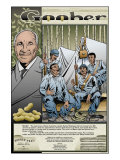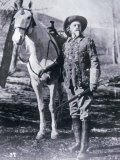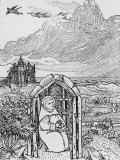|
|
|
|
|
|
|
|
Rachel Carson
b. 5-27-1907; Springdale, Pennsylvania
d. 4-14-1964
More than any other person, Rachel Carson helped make “ecology” a household word. She spent nearly fifteen years of her life working in obscurity for the U.S. Fish and Wildlife Service. But the publication of her books “The Sea Around Us” and “Silent Spring,” brought her immediate fame. ...Her first two books, “Under the Sea-Wind” and “The Sea Around Us,” describe the oceans and the life they contain. But it was “Silent Spring,” published in 1962, that made her famous. The book warned of the dangers of pesticides, which Ms. Carson discovered were killing fish and birds as well as insects. Some scientists said she exaggerated this danger. But most agreed that “Silent Spring” was both accurate and timely. The book lead directly to new laws regulating the use of pesticides, and it aroused millions to a new concern about humanity's growing impact on the natural environment around us. Text based on Great American Women poster series
Rachel Carson quote ~
• “The most alarming of all man's assaults upon the environment is the contamination of air, earth, rivers, and sea with dangerous and even lethal materials.”
• more Rachel Carson posters
|
|
|
|
|
|
|
Frederic Edward Clements
b. 9-16-1874; Lincoln, NE
d. 7-26-1945
Botanist and professor Frederic Edward Clements developed the theory that vegetation cover does not represent a permanent condition but can be understood as a sequence of stages resembling the development of an individual organism.
|
|
|
|
William F. “Buffalo Bill” Cody
b. 2-26-1846; LeClaire, Iowa
d. 1-10-1917; Colorado
The showman William F. “Buffalo Bill” Cody, noted for his conservation efforts, also spoke out in favor of women voting.
|
|
|
|
Barry Commoner
b. 5-28-1917; Brooklyn, New York
d. 9-30-2012; Manhattan
Barry Commoner, a biology professor and 1980 presidental candidate, wrote four laws of ecology, in The Closing Circle (1971) - (1971) -
1. Everything is Connected to Everything Else. There is one ecosphere for all living organisms and what affects one, affects all.
2. Everything Must Go Somewhere. There is no "waste" in nature and there is no “away” to which things can be thrown.
3. Nature Knows Best. Humankind has fashioned technology to improve upon nature, but such change in a natural system is “likely to be detrimental to that system.”
4. There Is No Such Thing as a Free Lunch. Everything comes from something. There's no such thing as spontaneous existence. [see Robert Heinlein]
|
|
|
|
Jacques-Yves Cousteau
b. 6-11-1910; Saint-André-de-Cubzac, France
d. 6-25-1997; Paris
Jacques-Yves Cousteau was an ecologist and researcher who shared his knowledge and discoveries of the oceans through television documentaries, books, and an environmental protection foundation.
Jacques-Yves Cousteau quotes ~
• “Water and air, the two essential fluids on which all life depends, have become global garbage cans.”
|
|
|
|
Saint Cuthbert of Lindisfarne
b. c. 634; Northunbria (Scotland)
d. 3-20-687
Between 676 and 684 the monk Cuthbert became a hermit on one of the Farne Islands where he instituted what may have been the first bird protection laws anywhere in the world. Today eider ducks are often called cuddy ducks (Cuthbert's ducks) in modern Northumbrian dialects.
|
|
|
previous page | top | next
ecologists | a | b | C | d | e | f | g | h | i-k | l | m | n-o | p | q-r | s | t-z
|
|
I have searched the web for visual, text, and manipulative curriculum support materials - teaching posters, art prints, maps, charts, calendars, books and educational toys featuring famous people, places and events - to help teachers optimize their valuable time and budget.
Browsing the subject areas at NetPosterWorks.com is a learning experience where educators can plan context rich environments while comparing prices, special discounts, framing options and shipping from educational resources.
Thank you for starting your search for inspirational, motivational, and educational posters and learning materials at NetPosterWorks.com. If you need help please contact us.
|
|
|




















